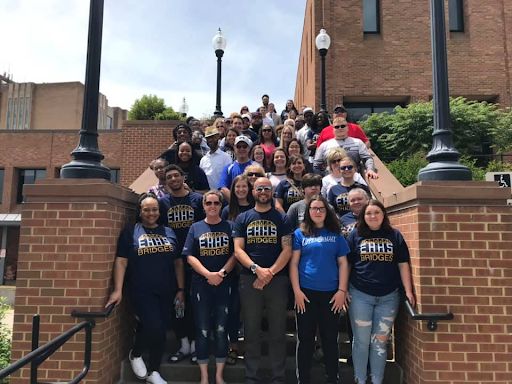Kent State Forms Bridges to Success with Summer Program

Previous Bridges Summer Program participants and their families stand together at the steps of the Kent State University Student Center. Courtesy of Daniel Nilsson.
September 8, 2019
For some first-year students, transitioning to the fast-paced and independent lifestyle of college can be difficult. The Bridges Summer Program, however, is working to ensure that incoming under-represented and first-generation students have a smooth transition to Kent State.
Housed in the College of Education, Health and Human Services, the Bridges Summer Program began in 2017 after two Kent State faculty formed the idea.
Alicia Crowe, associate dean for Undergraduate Studies in EHHS, and Daniel Nilsson, director of the Office of Diversity Outreach and Development, noticed that the EHHS data from 2011-16 showed that the students (who currently fit the demographics of Bridge Summer Program participants) were either dismissed from college or dropped out.
Crowe and Nilsson sought out a solution to the decreasing rates of graduation among these demographics, and the Bridges Summer Program was developed.
“For us, metaphorically, the ‘bridges’ meant bridges to college, bridges to graduation, and bridges to success,” Crowe said.
“These students are ready: they got into college, they got into their major. Maybe they just need a little extra help,” Nilsson said. “The only time you really can do that is during the summer prior to them coming.”
In its first summer, the Bridges Summer Program had nine participants. For 2020, the program is expected to have 20 participants.
While at Kent State, the students live in on campus housing for five weeks, are given FLASHcash to explore the town and have memberships to the student recreation center.
During their time on campus, students get to hear from speakers in EHHS while receiving peer tutoring and mentoring. They also participate in college success workshops and social activities in the local community.
“Faculty come and tell their stories of how they got to college, as well as the successes and failures they experienced,” Crowe said. “They’re very personal stories about who they are so that students can see what it’s like.”
Not only do the participants gain knowledge about what walking routes to take on their first day, but they also gain credits toward their graduation after successful completion of the program. Each student in the program takes a literacy course and a math course that are based off of their college placement tests.
“Traditionally, research shows that math is a hurdle for many students,” Crowe said. “If you get behind on math in your program, you get behind on graduating … for some people, that could mean they’re done.”
After the program is completed, the students check in periodically with Crowe and go to lunch together.
“We’re all here for them,” Crowe said. “That’s something that I think this group really comes away with when they leave Bridges. Everyone at this institution is here for them.”
Linden Miller is the Education, Health and Human Services reporter, contact her at [email protected].











